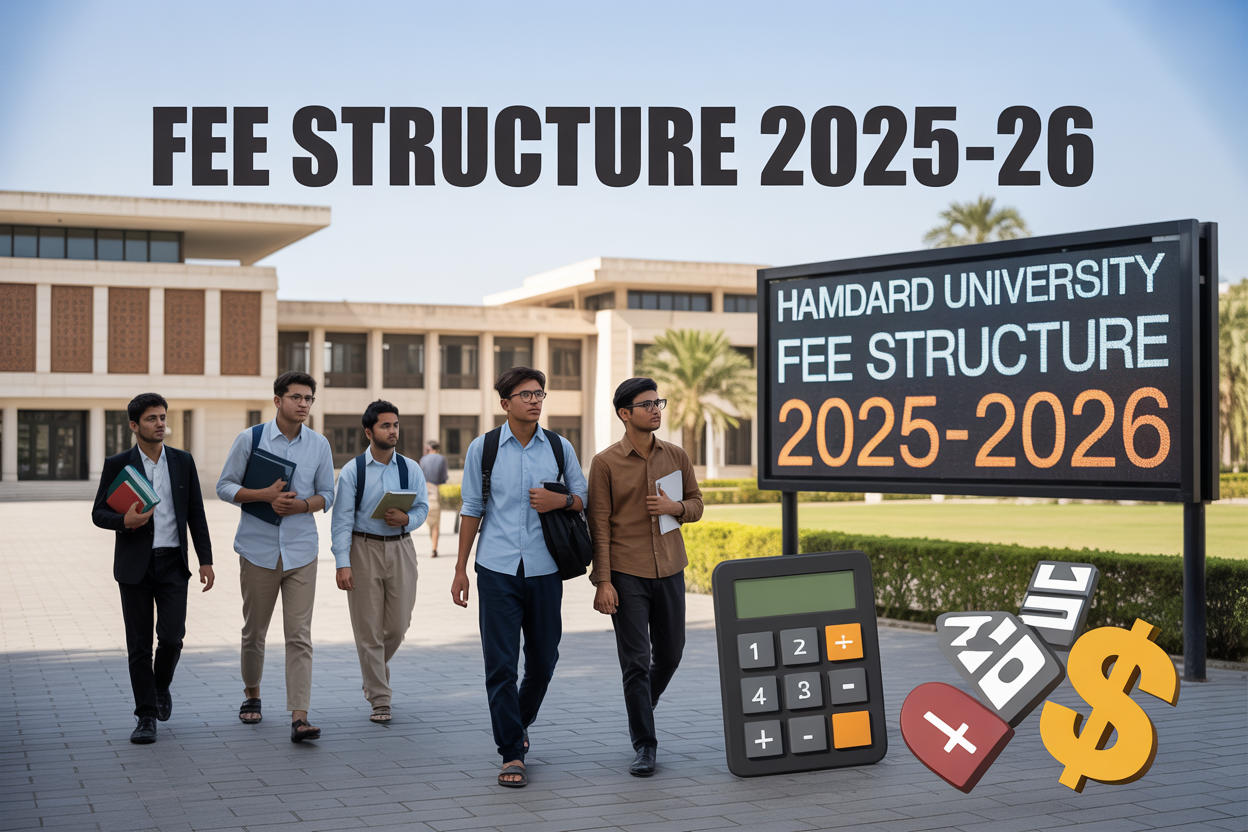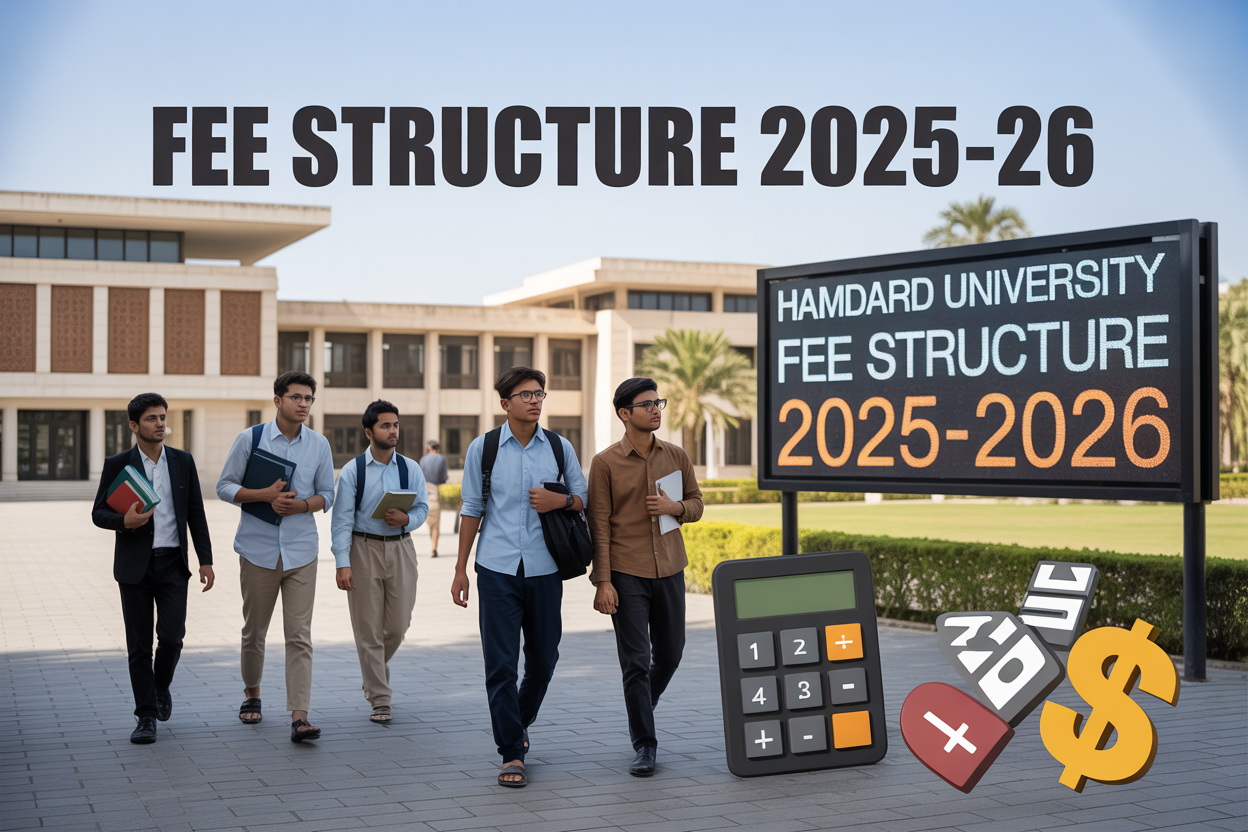
Hamdard University Fee Structure 2025-2026: Complete Cost Breakdown
Students and families researching Hamdard University costs need clear information about the Hamdard University Fee Structure 2025-2026 to make informed decisions about higher education investments.
This guide breaks down exactly what you’ll pay across different programs and faculties at Hamdard University. We’ll walk you through the complete fee categories and show you how costs vary by department. You’ll also discover available payment options and scholarship opportunities that can make your education more affordable.
Our breakdown covers faculty-wise fee structures, flexible payment plans, and practical budgeting tips to help you plan your finances effectively.
Overview of Hamdard University Fee Categories

Undergraduate Program Fees
Undergraduate programs at Hamdard University represent the foundation of academic excellence, with fee structures carefully designed to reflect the quality of education provided. Bachelor’s degree programs typically range from PKR 120,000 to PKR 180,000 per semester, depending on the chosen field of study. Science-based programs like pharmacy, engineering, and biotechnology command higher fees due to specialized laboratory facilities and equipment requirements.
Arts and humanities programs generally fall on the lower end of the fee spectrum, while business administration and computer science programs maintain moderate pricing. Students pursuing four-year degree programs should budget approximately PKR 960,000 to PKR 1,440,000 for their complete undergraduate education, excluding additional charges.
The university offers different payment schedules for undergraduate students, including semester-wise and annual payment options. Early payment discounts of 5-10% are available for students who settle their fees before the deadline.
Graduate Program Fees
Master’s degree programs at Hamdard University attract higher fee structures reflecting the advanced nature of graduate education. Semester fees for most master’s programs range from PKR 150,000 to PKR 220,000, with research-intensive programs commanding premium rates.
MBA programs represent the upper tier of graduate program fees, with semester costs reaching PKR 250,000 to PKR 300,000. This pricing reflects the program’s comprehensive curriculum, industry partnerships, and placement support services. Two-year master’s programs require a total investment of PKR 600,000 to PKR 1,200,000.
Specialized graduate programs in healthcare, engineering, and technology sectors carry additional laboratory and research fees. Part-time and evening graduate programs offer identical academic quality at slightly reduced fee structures, making advanced education more accessible to working professionals.
Professional Degree Costs
Professional degree programs at Hamdard University require substantial financial investment due to their specialized nature and industry requirements. Medical and dental programs represent the highest fee category, with annual costs ranging from PKR 800,000 to PKR 1,200,000.
Pharmacy doctoral programs (Pharm.D) typically cost PKR 400,000 to PKR 600,000 per year, while engineering professional degrees fall within the PKR 300,000 to PKR 500,000 annual range. These programs include clinical rotations, internships, and specialized equipment usage.
Law programs maintain moderate professional degree pricing at PKR 200,000 to PKR 350,000 annually. The university provides structured payment plans for professional degree students, recognizing the extended duration and higher costs of these programs.
Additional Charges and Miscellaneous Fees
Beyond tuition fees, students must account for various additional charges that contribute to the complete cost of education. Admission processing fees range from PKR 5,000 to PKR 15,000 depending on the program level and competitiveness.
Laboratory fees vary significantly by program, with science and engineering students paying PKR 20,000 to PKR 50,000 per semester for specialized equipment and materials. Library fees, sports facilities, and student activity charges typically add PKR 10,000 to PKR 25,000 to each semester’s costs.
Security deposits, examination fees, and degree processing charges represent additional financial considerations. International students face supplementary charges including visa processing support and international student services fees. Technology fees covering campus-wide IT infrastructure and online learning platforms add approximately PKR 8,000 to PKR 15,000 per semester across all programs.
Students should also budget for textbooks, transportation, and accommodation costs, which vary based on individual circumstances and campus location choices.
Faculty-wise Fee Breakdown for 2025-2026

Medicine and Allied Health Sciences Fees
Medical programs at Hamdard University command the highest fee structure across all faculties, reflecting the intensive nature of medical education and specialized facilities required. The MBBS program leads with fees reaching PKR 1,850,000 per annum for the 2025-2026 academic year, representing a 12% increase from the previous session.
The BDS (Bachelor of Dental Surgery) program follows closely at PKR 1,200,000 annually, while the PharmD (Doctor of Pharmacy) program is set at PKR 750,000 per year. Nursing programs, including BSN and Generic BSN, maintain more accessible fees at PKR 350,000 and PKR 280,000 respectively.
Allied health programs show varied pricing structures:
| Program | Annual Fee (PKR) | Lab Fee (PKR) |
|---|---|---|
| Medical Lab Technology | 450,000 | 25,000 |
| Physiotherapy | 520,000 | 30,000 |
| Radiology Technology | 480,000 | 35,000 |
| Respiratory Therapy | 420,000 | 20,000 |
Clinical rotations and hospital training components add approximately PKR 50,000-75,000 to medical program costs, while laboratory-intensive programs include equipment usage charges ranging from PKR 20,000-35,000 per semester.
Engineering and Technology Program Costs
Engineering disciplines maintain competitive fee structures while ensuring access to cutting-edge technology and laboratories. Computer Science and Software Engineering programs lead at PKR 580,000 per annum, reflecting high demand and industry-standard equipment requirements.
Electrical Engineering and Civil Engineering programs are priced at PKR 550,000 annually, while Mechanical Engineering follows at PKR 540,000. The newer Artificial Intelligence and Data Science program carries a premium fee of PKR 620,000, considering specialized faculty requirements and advanced computing resources.
Technology-focused programs include additional costs:
- Lab Access Fees: PKR 35,000-45,000 per semester
- Software Licensing: PKR 15,000-25,000 annually
- Project Materials: PKR 10,000-20,000 per year
- Industrial Training: PKR 30,000-40,000 (final year)
The university provides flexible payment options for engineering students, including semester-wise installments and industry-sponsored programs that can reduce overall costs by 20-30% for qualifying candidates.
Business Administration and Management Fees
Business programs offer diverse specializations with varying fee structures based on program intensity and market demand. The MBA program tops the list at PKR 450,000 per annum, while the BBA program maintains fees at PKR 320,000 yearly.
Specialized business programs show distinct pricing:
| Program | Annual Fee (PKR) | Specialization Fee (PKR) |
|---|---|---|
| MBA (Finance) | 450,000 | 25,000 |
| MBA (Marketing) | 450,000 | 20,000 |
| MBA (HRM) | 440,000 | 15,000 |
| BBA (Banking) | 340,000 | 20,000 |
| BBA (International Business) | 360,000 | 30,000 |
Evening and weekend MBA programs carry a 15% premium due to flexible scheduling and working professional accommodation. Executive MBA programs command PKR 650,000 annually, including industry networking events, guest lectures, and international study tours.
Additional business program costs include case study materials (PKR 8,000 per semester), business simulation software access (PKR 12,000 annually), and mandatory internship coordination fees (PKR 15,000). The university’s corporate partnerships often provide scholarship opportunities and reduced fees for employees of partner organizations.
Payment Plans and Financial Flexibility Options

Semester-wise Payment Schedule
Hamdard University operates on a semester-based fee collection system, with payments typically due at the beginning of each academic semester. The university has structured its payment schedule to align with the academic calendar, making budgeting easier for students and families.
For the 2025-2026 academic year, fees are divided into two main payment periods:
- Fall Semester: Payment due by August 15, 2025
- Spring Semester: Payment due by January 10, 2026
Students receive fee vouchers approximately 30 days before each deadline through the university’s online portal. The semester-wise breakdown includes tuition fees, laboratory charges, library fees, and student activity charges bundled together for convenience.
Installment Plans Available
Understanding the financial challenges students face, Hamdard University offers flexible installment options to ease the burden of lump-sum payments. The university provides several installment structures tailored to different financial situations.
Three-Payment Plan: Students can split their semester fees into three equal installments:
- First installment: 40% due at semester start
- Second installment: 30% due after 6 weeks
- Third installment: 30% due after 12 weeks
Monthly Payment Option: Available for selected programs, this plan spreads fees across 5 monthly payments per semester with a nominal processing fee of PKR 500 per installment.
Parent-Employer Partnership Plans: Special arrangements for children of corporate employees, allowing direct salary deductions with extended payment periods up to 8 months per semester.
To qualify for installment plans, students must maintain satisfactory academic standing and cannot have outstanding dues from previous semesters.
Early Payment Discounts
Hamdard University rewards prompt fee payment with attractive discount schemes designed to encourage early settlement of dues. These incentives benefit both the institution’s cash flow and student finances.
Annual Payment Discount: Students paying full academic year fees by July 31, 2025, receive a 5% discount on total tuition fees. This translates to significant savings, especially for professional programs.
Semester Early Bird Discount: A 2% discount applies when semester fees are paid 30 days before the official due date. This option works well for families planning their education expenses in advance.
Sibling Discount Combination: Families with multiple children enrolled simultaneously receive an additional 3% discount on the younger sibling’s fees when combined with early payment options.
Merit-based Early Payment Rewards: Students maintaining a CGPA above 3.5 and paying fees early qualify for an extra 1% discount, encouraging both academic excellence and financial responsibility.
Late Payment Penalties and Policies
While Hamdard University strives to be accommodating, late payment policies ensure institutional financial stability and fairness among all students. The penalty structure is progressive and clearly communicated.
Grace Period: Students have a 10-day grace period after the due date without penalties, recognizing that banking delays and unforeseen circumstances can occur.
Late Fee Structure:
- Days 11-30: PKR 1,000 late fee
- Days 31-60: PKR 2,500 additional penalty
- Beyond 60 days: PKR 5,000 plus potential class suspension
Academic Hold Policy: Students with fees outstanding beyond 45 days face academic holds, preventing registration for subsequent semesters, transcript requests, or degree issuance until dues are cleared.
Readmission Requirements: Students whose enrollment is cancelled due to non-payment must pay all outstanding amounts plus a readmission fee of PKR 10,000 to resume studies.
The university’s finance office works closely with students facing genuine hardships, offering payment plan modifications and connecting them with financial aid resources when possible.
Financial Aid and Scholarship Opportunities

Merit-based Scholarship Programs
Hamdard University offers several merit-based scholarships that reward academic excellence and outstanding performance. The University Merit Scholarship covers up to 50% of tuition fees for students who maintain a GPA of 3.5 or higher throughout their degree program. Students must reapply each semester and demonstrate consistent academic performance to retain this benefit.
The Dean’s List Scholarship targets top performers in each faculty, providing 25% fee reduction for students ranking in the top 10% of their respective programs. This scholarship recognizes not just grades but also participation in research projects, academic competitions, and scholarly activities.
Special talent scholarships are available for students excelling in sports, arts, and extracurricular activities. These awards range from 15% to 30% fee waivers and often include additional benefits like priority course registration and mentorship opportunities with faculty members.
International students can access the Global Excellence Scholarship, which offers substantial fee reductions based on their previous academic credentials and standardized test scores. This program particularly benefits students from partner universities and countries with bilateral education agreements.
Need-based Financial Assistance
The university’s financial aid office evaluates students’ economic circumstances through a comprehensive assessment process. Families must submit detailed financial documentation, including income statements, tax returns, and proof of dependents to qualify for need-based assistance.
The Hardship Fund provides emergency financial support for students facing unexpected financial crises. This program offers short-term loans, fee deferrals, and sometimes direct grants to help students continue their education without interruption. The fund covers situations like family medical emergencies, job loss, or natural disasters affecting family income.
Work-study programs allow eligible students to earn money while gaining valuable experience on campus. These positions include research assistantships, library support, administrative roles, and tutoring opportunities. Students can earn between PKR 15,000 to 25,000 monthly while maintaining their academic commitments.
The university also partners with local businesses to provide internship stipends and part-time employment opportunities that align with students’ career goals. These programs help reduce financial burden while building professional networks and practical skills.
Government Scholarship Integration
Hamdard University actively participates in federal and provincial scholarship programs, making it easier for students to access government funding. The Higher Education Commission (HEC) scholarships are seamlessly integrated into the university’s admission and financial aid processes.
The Ehsaas Undergraduate Scholarship Program provides comprehensive support for deserving students from low-income families. Recipients receive full tuition coverage, monthly stipends for living expenses, and additional allowances for books and academic materials. The university’s financial aid office assists students with application procedures and required documentation.
Punjab Educational Endowment Fund (PEEF) scholarships are available for students from Punjab province, covering significant portions of tuition fees based on merit and financial need. The university maintains direct communication with PEEF administrators to streamline the application and disbursement process.
Federal government schemes like the Prime Minister’s Youth Program and various ministry-specific scholarships are also accessible to qualified students. The university’s scholarship coordination team regularly updates students about new government initiatives and application deadlines, ensuring maximum participation in these beneficial programs.
Students can combine multiple funding sources, including government scholarships, university aid, and private sponsorships, to create comprehensive financial support packages that make higher education accessible regardless of economic background.
Comparison with Previous Year Fee Structure

Fee Increase Percentage Analysis
The 2025-2026 academic year brings notable changes to Hamdard University’s fee structure across different faculties. Medical programs experienced the highest increase at 8.5%, raising annual tuition from PKR 1,200,000 to PKR 1,302,000. Engineering and technology programs saw a 7.2% hike, moving from PKR 850,000 to PKR 911,200 per year.
Business and management studies increased by 6.8%, with fees rising from PKR 450,000 to PKR 480,600. Pharmacy programs faced a 7.8% jump, now costing PKR 780,000 compared to last year’s PKR 723,000. Social sciences and arts programs remained relatively stable with just a 4.5% increase, moving from PKR 380,000 to PKR 397,100.
| Faculty | Previous Year (PKR) | Current Year (PKR) | Increase % |
|---|---|---|---|
| Medicine | 1,200,000 | 1,302,000 | 8.5% |
| Engineering | 850,000 | 911,200 | 7.2% |
| Pharmacy | 723,000 | 780,000 | 7.8% |
| Business | 450,000 | 480,600 | 6.8% |
| Arts/Social Sciences | 380,000 | 397,100 | 4.5% |
New Charges Introduced in 2025-2026
Several new fee components have been added to the university’s billing structure this year. A technology enhancement fee of PKR 15,000 per semester now applies to all students, covering upgraded laboratory equipment and digital learning platforms.
The university introduced a career counseling and placement fee of PKR 8,000 annually, providing students access to professional development workshops and industry networking events. International students face an additional global engagement fee of PKR 25,000, which includes cultural exchange programs and international certification opportunities.
A sustainability initiative fee of PKR 5,000 per year supports the university’s green campus projects, including solar installations and waste management systems. Students using campus transportation now pay a shuttle service fee of PKR 12,000 per semester, which was previously included in general fees.
Hostel residents encounter new charges including a maintenance surcharge of PKR 20,000 annually and a security enhancement fee of PKR 8,000. These additions reflect the university’s investment in improved living conditions and campus safety measures.
Cost-benefit Analysis for Students
Despite the fee increases, students gain access to enhanced facilities and services that justify the additional costs. The new technology fee brings state-of-the-art equipment worth PKR 50 million across various departments, directly benefiting student learning experiences.
Career services expansion includes partnerships with 150+ companies for internships and job placements, potentially increasing graduate employment rates by 15-20%. The placement assistance alone can help students recover the additional fees through higher starting salaries.
Medical students benefit from upgraded simulation labs and clinical equipment valued at PKR 80 million, providing hands-on experience with industry-standard tools. Engineering programs now offer specialized software licenses worth PKR 200,000 per student, previously unavailable.
The sustainability initiatives create a healthier campus environment while teaching students about environmental responsibility – skills highly valued by modern employers. Transportation services reduce commuting costs for day scholars by approximately PKR 30,000 annually compared to private transport options.
International exposure through new programs opens doors to global opportunities, with alumni reporting 25% higher salary packages after participating in exchange initiatives. The comprehensive support system, though costlier upfront, delivers measurable returns on educational investment.
Hidden Costs and Budget Planning Tips

Hostel and Accommodation Expenses
Accommodation costs at Hamdard University can significantly impact your overall budget. Hostel fees typically range from PKR 15,000 to 25,000 per month, depending on whether you choose single or shared occupancy. These rates cover basic amenities like electricity, water, and internet connectivity.
Beyond monthly rent, students need to budget for security deposits (usually equivalent to two months’ rent), utility surcharges during peak seasons, and maintenance fees. Room furnishing expenses add another PKR 10,000-15,000 initially, covering essentials like bedding, study table accessories, and personal storage solutions.
Many students overlook laundry services, which cost approximately PKR 2,000-3,000 monthly. If you’re considering off-campus housing, factor in rental agreements, utility connections, and potentially higher monthly costs ranging from PKR 20,000 to 40,000 depending on location and amenities.
Laboratory and Library Fees
Laboratory usage fees vary significantly across different faculties. Pharmacy and medical students face higher charges, typically PKR 3,000-8,000 per semester for specialized equipment access and consumables. Engineering students should budget around PKR 2,500-5,000 per semester for workshop and lab materials.
Library fines might seem minor but can accumulate quickly. Late return penalties start at PKR 10 per day per book, while replacement costs for lost materials can reach PKR 500-2,000. Digital resource access fees, including online journal subscriptions and database usage, often add PKR 1,000-2,500 to your semester expenses.
Printing and photocopying services within campus facilities charge competitive rates, but high-volume users should budget PKR 1,500-3,000 monthly for academic materials reproduction.
Transportation and Meal Costs
Daily transportation costs vary based on your residence location. University shuttle services charge approximately PKR 2,000-4,000 monthly, while private transportation options like ride-sharing apps cost PKR 200-500 daily for regular commutes.
Campus meal plans offer good value, ranging from PKR 8,000-12,000 monthly for comprehensive coverage. However, many students supplement with external dining, adding PKR 3,000-6,000 monthly to their food budget. Snacks, beverages, and occasional restaurant visits can easily increase monthly food expenses to PKR 15,000-20,000.
Budget-conscious students often combine campus dining with home-cooked meals or shared cooking arrangements in hostels, reducing costs to PKR 6,000-10,000 monthly.
Examination and Certification Charges
Examination fees beyond regular tuition include retake charges for failed subjects, typically PKR 1,500-3,000 per subject. Transcript requests cost PKR 500-1,000 per copy, while official degree attestation and verification services range from PKR 2,000-5,000.
Professional certification exam preparations often require additional coaching or preparatory materials, costing PKR 10,000-25,000 depending on the field. Medical students face particularly high costs for licensing examinations and board certifications.
International credential evaluation and document legalization for students planning overseas education add PKR 5,000-15,000 to graduation expenses. Plan these costs early, as they’re often required for job applications or further education pursuits.

The fee structure at Hamdard University for 2025-2026 shows clear variations across different faculties, with medical programs carrying the highest costs and arts programs being the most affordable. Students can take advantage of flexible payment plans that spread tuition costs across semesters, making education more accessible for families with varying financial situations. The university also offers several scholarship programs and financial aid options that can significantly reduce the overall burden.
When planning your budget, remember to account for additional expenses like library fees, lab charges, and examination costs that aren’t always included in the basic tuition figures. Start exploring financial aid options early in your application process, as many scholarships have specific deadlines and requirements. Take time to compare the current fees with what you might have paid in previous years to get a realistic picture of your investment. With proper planning and awareness of all available resources, you can make informed decisions about financing your education at Hamdard University.

